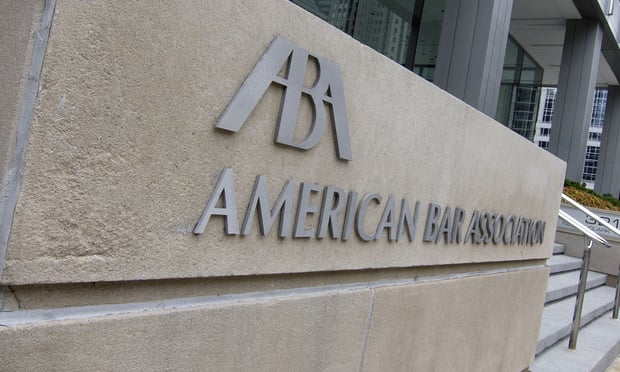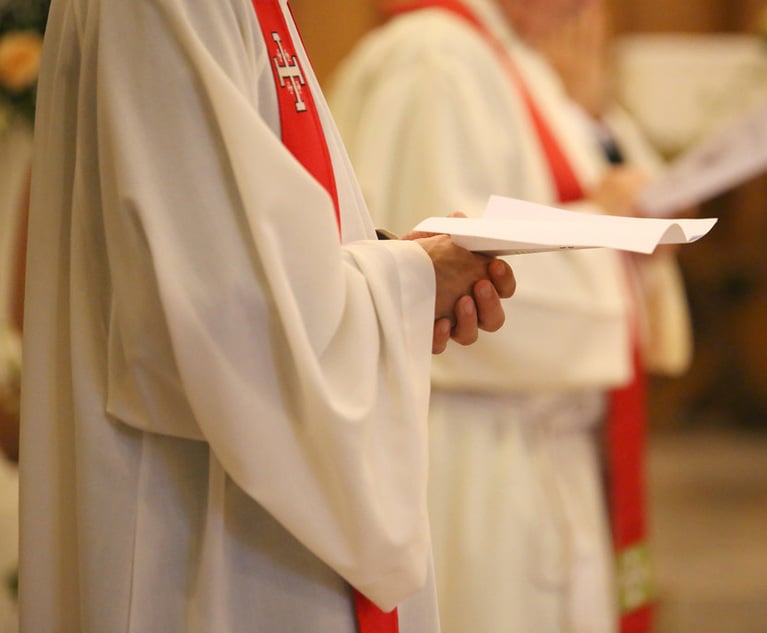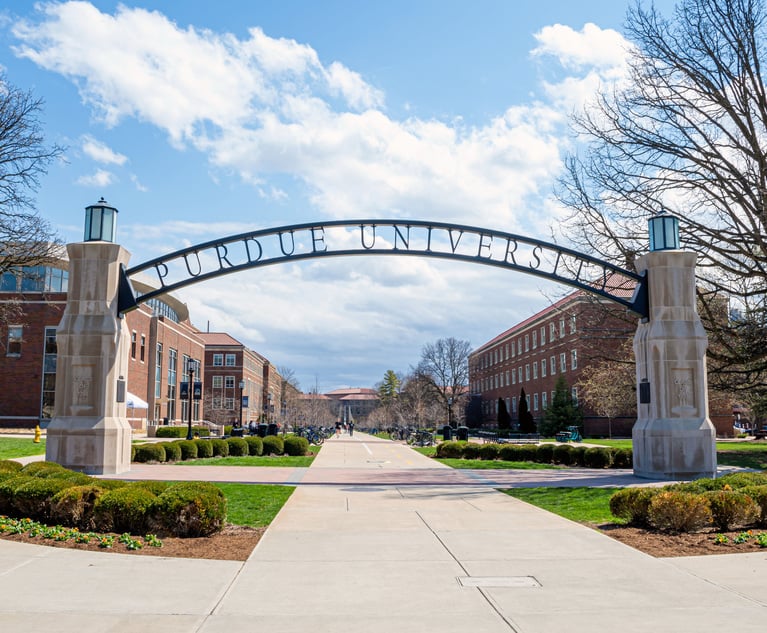ABA to Reconsider Proposal to Tighten Bar Exam Pass Standards
The arm of the American Bar Association that oversees legal education is once again trying to strengthen its bar pass requirements for law schools. But diversity advocates are pushing back, just as they did in 2017 when they successfully defeated the same proposal.
January 22, 2019 at 02:49 PM
7 minute read
 American Bar Association headquarters in Chicago.
American Bar Association headquarters in Chicago.
The second time could be the charm for pushing through a stronger bar pass standard for law schools.
The American Bar Association's House of Delegates on Monday will consider a proposal to bolster the existing rule, requiring at least 75 percent of a school's graduates to pass the bar within two years of leaving campus or risk losing accreditation. The House rejected the same proposal in February 2017 amid concern from diversity advocates who said it could imperil schools with a large percentage of minority students, especially at a time when pass rates across the country have plummeted.
Among those opposing the measure is a coalition of minority and women's entities within the ABA, which wrote to the legal education council on Jan. 11 to express “serious misgivings” about the proposal. “We encourage the Council to abandon the revised bar passage rule at least until it conducts further analysis of the effects of proposed changes on access to the profession for underrepresented lawyers,” the letter reads.
The proposal touched off a heated debate in 2016 and 2017, but the response this time has been less vocal, said Barry Currier, the ABA's managing director of accreditation and legal education. “It has been on the agenda of the [Council of the Section of Legal Education and Admission to the Bar] a couple times, and it was relatively quiet,” he said of the proposal's second round. “We didn't hear much.”
But at least one law school administrator—Southern University Law Center Chancellor John Pierre—said he plans to lobby ABA delegates when they meet in Las Vegas next week to reject the proposal on similar grounds. He added that fellow deans are split on the issue.
“Based on my preliminary research, the schools that are at greatest risk of not meeting the standard have large minority student populations—about half of those students would be from underrepresented groups at some of those schools,” Pierre said in an interview Tuesday. “To me, that runs contrary to [the ABA's law school diversity standard] and the broader ABA goal of increasing representation of lawyers from underrepresented groups.”
Black and Hispanic students on average score lower on the Law School Admission Test than their white counterparts, meaning they are overrepresented at less selective law schools. The racial gap on standardized testing persists on the bar exam. While 52 percent of white takers passed the July 2016 bar exam, that pass rate was 34 percent for Hispanics and 21 percent for African-American test takers, according to a 2017 state bar report.
Amy Timmer, interim dean at Western Michigan University Cooley Law School, also has circulated an opposition memo that cites differing pass rates among jurisdictions and the high percentage of minority students enrolled at the schools with lower pass rates as reasons to reject the proposal. By her count, the 32 schools with pass rates below 80 percent—or those below or in danger of falling below the proposed cutoff—enroll nearly a third of all minority law students in the country.
Supporters of the change say that law schools with large minority enrollment can't effectively diversify the legal profession if their students aren't passing the bar in significant numbers. And students who attend schools with low bar pass rates risk accumulating hefty educational debt without the ability to practice after three years of study.
“As an organization and a board, we favor it,” said National Conference of Bar Examiners President Judith Gundersen of the proposed change. “It seems like a reasonable standard to us. Law students have the right to know, 'What are my chances [of passing the bar] when looking at a particular school?' We think it's necessary for the protection of the public, and it doesn't prevent a graduate from sitting for the bar exam more times than is permitted in this two-year period.”
The proposed new standard is intended to simplify the existing one, which allows schools to meet the bar pass threshold in several ways. First, schools are in compliance as long as at least 75 percent of graduates pass the bar exam within five years of leaving campus. Alternatively, schools meet the current standard if their first-time pass rate is no lower than 15 percent of the statewide average in their particular jurisdiction. (Opponents have said this rule makes little sense in states with just one or two law schools.)
The proposed change eliminates the first-time pass rate provision and shortens the time span to meet the 75 percent threshold from five to two years. Additionally, it requires schools to report bar pass rates on all graduates who take the exam. The existing rule mandates that schools report data for at least 70 percent of graduates.
A study on repeat test taker by the National Conference of Bar Examiners found that very few people take the bar exam more than four times, and the number of people who continue to take the test beyond the two-year post-graduation point is negligible.
Opponents of the proposal argued in 2016 and 2017 that the ABA needed to gather more data on the potential impact of the stronger standard before moving forward, and the House of Delegates agreed. The ABA last year released data on the “ultimate bar pass rate,” from 2015, meaning the percentage of 2015 graduates who passed the bar within two years. Those figures show how schools would have fared under the proposed new bar pass standard.
Schools reported data on nearly 98 percent of 2015 graduates who sat for the bar and more than 88 percent passed within two years, according to a legal education council memo in support of the change. But results varied by school. In total, 19 of the 203 ABA-accredited law schools fell short of the 75 percent pass threshold over two years. Two of those schools were in California and two were part of Historically Black Colleges and Universities. (Law deans from HBCUs and California law schools were the most vocal opponents to the proposed change in 2016 and 2017.)
The ABA's legal education council examined the data and determined that the proposed change would not disparately hurt HBCUs or law schools in California, Currier said.
“Additionally, 88.3 percent of everyone passed,” he said. “Asking every school to have at least 75 didn't seem like an unreasonable request. The standard is based on the notion that you're supposed to admit people who are qualified and give them a program that allows them to graduate and pass the bar. The bar pass standard is the best measure of whether a school is doing that.”
The stronger bar pass standard could still move ahead even if the House of Delegates rejects it for a second time. The House must concur with changes to the ABA's law school accreditation standards, but it may only reject such a change twice. After that, the legal education council has the ability to implement that change without the House's blessing.
This content has been archived. It is available through our partners, LexisNexis® and Bloomberg Law.
To view this content, please continue to their sites.
Not a Lexis Subscriber?
Subscribe Now
Not a Bloomberg Law Subscriber?
Subscribe Now
NOT FOR REPRINT
© 2025 ALM Global, LLC, All Rights Reserved. Request academic re-use from www.copyright.com. All other uses, submit a request to [email protected]. For more information visit Asset & Logo Licensing.
You Might Like
View All
Librarian's Termination Violated First Amendment Protections, Lawsuit Claims
3 minute read
Divided State Supreme Court Clears the Way for Child Sexual Abuse Cases Against Church, Schools

Longtime Purdue GC Accused of Drunken Driving Hires Big-Name Defense Attorney
3 minute read
LSU General Counsel Quits Amid Fracas Over First Amendment Rights of Law Professor
7 minute readTrending Stories
- 1The End of Innocence? DEP’s End Run Around ‘All Appropriate Inquiry’ Spill Act Protections
- 2Pistachio Giant Wonderful Files Trademark Suit Against Canadian Maker of Wonderspread
- 3New York State Authorizes Stand-Alone Business Interruption Insurance Policies
- 4Buyer Beware: Continuity of Coverage in Legal Malpractice Insurance
- 5‘Listen, Listen, Listen’: Some Practice Tips From Judges in the Oakland Federal Courthouse
Who Got The Work
J. Brugh Lower of Gibbons has entered an appearance for industrial equipment supplier Devco Corporation in a pending trademark infringement lawsuit. The suit, accusing the defendant of selling knock-off Graco products, was filed Dec. 18 in New Jersey District Court by Rivkin Radler on behalf of Graco Inc. and Graco Minnesota. The case, assigned to U.S. District Judge Zahid N. Quraishi, is 3:24-cv-11294, Graco Inc. et al v. Devco Corporation.
Who Got The Work
Rebecca Maller-Stein and Kent A. Yalowitz of Arnold & Porter Kaye Scholer have entered their appearances for Hanaco Venture Capital and its executives, Lior Prosor and David Frankel, in a pending securities lawsuit. The action, filed on Dec. 24 in New York Southern District Court by Zell, Aron & Co. on behalf of Goldeneye Advisors, accuses the defendants of negligently and fraudulently managing the plaintiff's $1 million investment. The case, assigned to U.S. District Judge Vernon S. Broderick, is 1:24-cv-09918, Goldeneye Advisors, LLC v. Hanaco Venture Capital, Ltd. et al.
Who Got The Work
Attorneys from A&O Shearman has stepped in as defense counsel for Toronto-Dominion Bank and other defendants in a pending securities class action. The suit, filed Dec. 11 in New York Southern District Court by Bleichmar Fonti & Auld, accuses the defendants of concealing the bank's 'pervasive' deficiencies in regards to its compliance with the Bank Secrecy Act and the quality of its anti-money laundering controls. The case, assigned to U.S. District Judge Arun Subramanian, is 1:24-cv-09445, Gonzalez v. The Toronto-Dominion Bank et al.
Who Got The Work
Crown Castle International, a Pennsylvania company providing shared communications infrastructure, has turned to Luke D. Wolf of Gordon Rees Scully Mansukhani to fend off a pending breach-of-contract lawsuit. The court action, filed Nov. 25 in Michigan Eastern District Court by Hooper Hathaway PC on behalf of The Town Residences LLC, accuses Crown Castle of failing to transfer approximately $30,000 in utility payments from T-Mobile in breach of a roof-top lease and assignment agreement. The case, assigned to U.S. District Judge Susan K. Declercq, is 2:24-cv-13131, The Town Residences LLC v. T-Mobile US, Inc. et al.
Who Got The Work
Wilfred P. Coronato and Daniel M. Schwartz of McCarter & English have stepped in as defense counsel to Electrolux Home Products Inc. in a pending product liability lawsuit. The court action, filed Nov. 26 in New York Eastern District Court by Poulos Lopiccolo PC and Nagel Rice LLP on behalf of David Stern, alleges that the defendant's refrigerators’ drawers and shelving repeatedly break and fall apart within months after purchase. The case, assigned to U.S. District Judge Joan M. Azrack, is 2:24-cv-08204, Stern v. Electrolux Home Products, Inc.
Featured Firms
Law Offices of Gary Martin Hays & Associates, P.C.
(470) 294-1674
Law Offices of Mark E. Salomone
(857) 444-6468
Smith & Hassler
(713) 739-1250








